Elon Musk and the controversy in South Africa over ‘Kill the Boer’: A song that encourages genocide?
The South African-born tycoon, owner of X and Tesla, accuses leftist leader Julius Malema of supporting the extermination of whites for singing a controversial ‘anti-apartheid’ song

For South African-born tycoon Elon Musk, inflammatory statements are his daily bread and butter. But talking about a supposed extermination of the white race is excessive even for the owner of X (formerly Twitter) and Tesla. “They are openly pushing for genocide of white people in South Africa,” he wrote in July as a comment to a video posted on his social network. In it, Julius Malema, leader of the left-wing Economic Freedom Fighters (EFF) party, the third largest force in the South African Parliament, is seen singing the anti-apartheid song Kill the Boer – “kill the farmer” – at a rally in front of 100,000 people. The word boer comes from Afrikaans and can also refer to white people in general.
Musk called on the president of South Africa, Cyril Ramaphosa, to comment on the matter and also called for a boycott of The New York Times for having published an article in which South African historians were cited who claimed that the lyrics of the song were not to be interpreted literally.
“The song is not about a person or a racial group, but about the system,” says Susana Molins-Lliteras, a historian at the University of Cape Town. The Spanish scholar clarifies that, although historians do not share a common position on the exact origin of the song, it achieved widespread popularity in 1993 with the assassination of Chris Hani, leader of the South African Communist Party, by a white right-wing extremist.
In the 1990s, the song did not cause controversy, according to the historian. It was in 2010 when Kill the Boer generated the debate that continues to this day. That year, Malema began singing it at rallies of the African National Congress, a party whose youth group he presided over. This, explains Molins-Lliteras, angered right-wing groups who said that the song was no longer appropriate and associated it with the violence that was taking place against white farmers. Malema was taken to court. He was never sentenced, although the court prohibited the song from continuing to be sung, a decision that last year was reversed by the Johannesburg Equality Court, protecting freedom of expression. “The court said that it was not discriminatory and that it did not incite violence because the song had to be analyzed in its historical context,” clarifies Molins-Lliteras.
Malema has never stopped singing Kill the Boer and he has not remained silent in the face of Musk’s claims. In his social media accounts he has called him “illiterate” and “crazy with money.” The discussion seemed to be confined to Musk and Malema until the conservative Democratic Alliance party, the second largest political force, announced that it intends to file charges before international justice against the EFF leader and against the African National Congress — which has governed South Africa since 1994 — for encouraging hatred with the song, although the ruling party agreed in 2012 to no longer perform it at its rallies.
With this decision the issue seemed settled, but Musk, with his media power, has brought Kill the Boer back to the center of the debate. The historian from the University of Cape Town believes that Musk’s statements align with the conspiracy theories propagated by the far right: “In South Africa there is a lot of violence and there are white farmers who are murdered, but if you look at the numbers, you will see that every year the majority of homicide victims are Black people.”
Sign up for our weekly newsletter to get more English-language news coverage from EL PAÍS USA Edition
Tu suscripción se está usando en otro dispositivo
¿Quieres añadir otro usuario a tu suscripción?
Si continúas leyendo en este dispositivo, no se podrá leer en el otro.
FlechaTu suscripción se está usando en otro dispositivo y solo puedes acceder a EL PAÍS desde un dispositivo a la vez.
Si quieres compartir tu cuenta, cambia tu suscripción a la modalidad Premium, así podrás añadir otro usuario. Cada uno accederá con su propia cuenta de email, lo que os permitirá personalizar vuestra experiencia en EL PAÍS.
¿Tienes una suscripción de empresa? Accede aquí para contratar más cuentas.
En el caso de no saber quién está usando tu cuenta, te recomendamos cambiar tu contraseña aquí.
Si decides continuar compartiendo tu cuenta, este mensaje se mostrará en tu dispositivo y en el de la otra persona que está usando tu cuenta de forma indefinida, afectando a tu experiencia de lectura. Puedes consultar aquí los términos y condiciones de la suscripción digital.









































